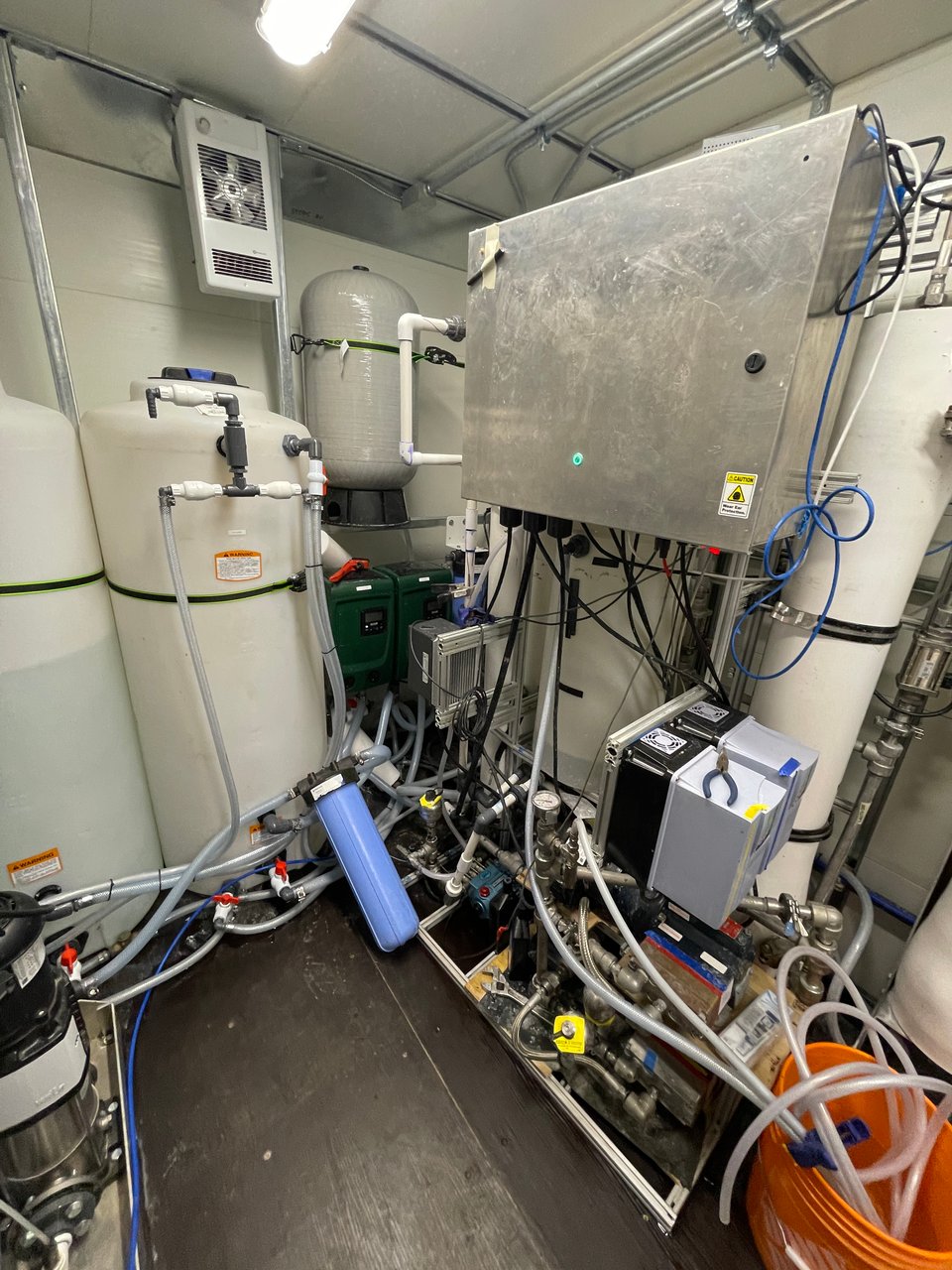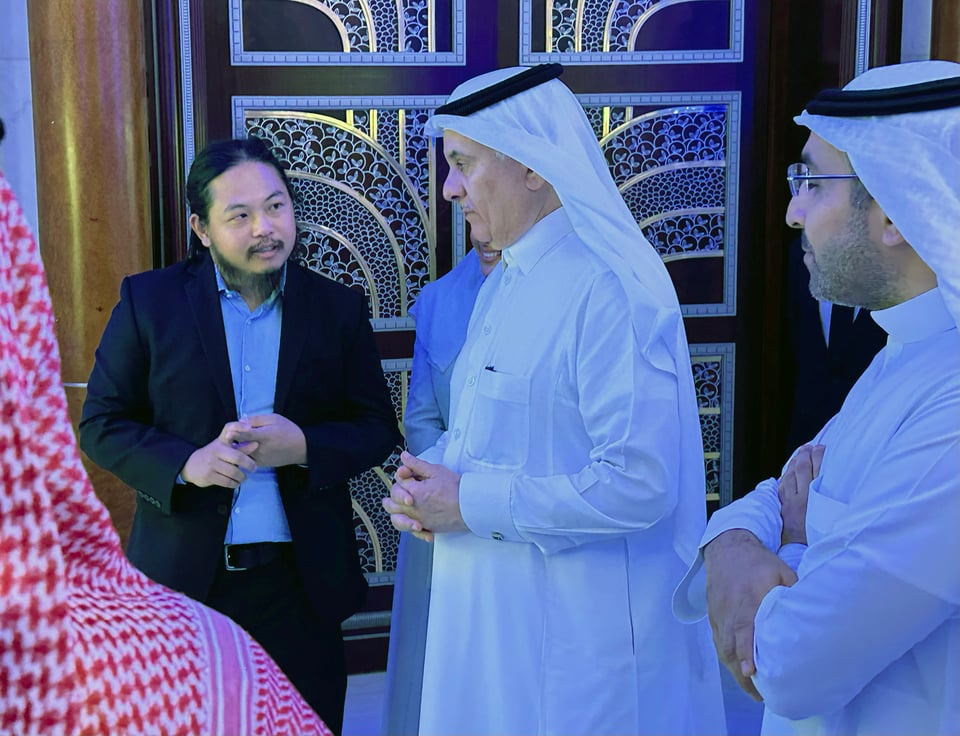News Former student of J-WAFS director makes strides in desalination
Quantum Wei and his company Harmony Desalting take home recent awards from around the globe.
Carolyn Blais, J-WAFS January 11, 2024
During the summer of 2017, Quantum Wei BA ’15, SM ’17, PhD ’21 started working on batch reverse osmosis technology in the lab of John H. Lienhard V, director of J-WAFS and MIT professor in the Department of Mechanical Engineering. Batch reverse osmosis refers to a desalination process in which water is treated in batches (as opposed to continuously) by pushing salty water against a membrane, forcing freshwater through.
Wei worked with others in the lab to create a technology that reduces energy use by 10% compared to conventional reverse osmosis (RO). The system uses actuated valves, water tanks, and a bladder vessel, which allows the system to save energy by varying the applied pressure level. The batch process also allows for improved water recovery and operational productivity without sacrificing membrane longevity. In 2020, Wei co-founded Harmony Desalting to bring the technology to market.
“We are working to make water desalination more affordable, reliable, and sustainable,” says Wei. He adds that the company’s technology “has ultimate energy efficiency, is resistant to membrane fouling, and is focused around a process innovation, rather than inventing a new material or membrane,” which is important for scale-up.
The company has gone on to win several awards, which Wei says have been validation for much hard work and helped bolster the company’s credibility. For example, in August 2022, Harmony proved the effectiveness of its batch RO process during a week-long event called the More Water Less Concentrate (MWLC) challenge. The Harmony team included Professor Lienhard as well as Professor Emily Tow of Olin College of Engineering (another former student of the Lienhard lab). The team won the MWLC competition and was awarded $150,000 in funding.

el Titan, ready to go for the Pop Up City contest
In October 2022, Wei traveled to Sydney, Australia for the International Desalination Association (IDA) World Congress, where researchers and practitioners of desalination and water re-use gathered to connect with potential partners, suppliers, and customers. At the event, Wei networked with Aarya Shahsavar, the CEO of Innocorps, a water purification company. Shahsavar explained how Innocorps was working on a pilot demonstration for Canada’s Department of National Defence's Innovation for Defence Excellence and Security (IDEaS) Pop Up City Contest. The proposal sought to answer the question: can batch RO be used to increase the water recovery of a mobile wastewater re-use system? The goal would be to minimize liquid waste while maintaining low energy usage. Harmony joined the Innocorps team and began working on a prototype of the batch RO system, which they referred to as el Titan. Although the team encountered some challenges, Wei noted that by the end of the 7-day contest, the team’s direct potable re-use system had “produced 179,108 L of potable water, exceeding the target by 13.7%.” This past November, the team was announced as the winner of the competition, securing a $2M prize.
The accolades continued throughout the fall when Wei was asked to pitch in Jeddah, Saudi Arabia at a three-day conference for the Global Prize in Desalination (GPID), bestowed by His Excellency Engineer Abdulrahman Abdulmohsen AlFadley, the Minister of Environment, Water and Agriculture of Saudi Arabia. Wei’s pitch was on the “the ability of batch RO to integrate well with renewables and reduce the size of seawater intake and brine outfall structures.” The GPID conference offered insights, presentations, and networking opportunities, with the goal of enhancing the availability, affordability, and accessibility of water for all through the advancement of innovative water solutions. At the event, the most promising technologies in water desalination were rewarded across a range of categories, with Harmony taking home the award for “Most Promising Technology in Reducing Chemicals & Consumables.” An international jury of desalination experts, including industry veterans, academics, and financiers, served as the selection committee. Harmony was awarded a trophy, $50K in prize money, and $75K in pilot support with the Saline Water Conversion Company (SWCC).
In yet another piece of good news this November, the U.S. Bureau of Reclamation announced that Harmony will receive $300K in federal funding for desalination and water purification research, through its Pitch to Pilot Program.
“Of course, the cash prizes are a lifeline for a currently unfunded water startup,” says Wei. “Water doesn't seem to attract quite as much funding as energy and carbon capture,” he notes. The prize money has allowed Wei to bring on Harmony’s first full-time hire, a returning intern from the summer who was initially supported by the MassCEC Clean Energy Internship program. The company is hoping to hire another individual to serve as a research engineer to develop new water treatment processes, deploy pilot systems, and design products.
Other spinouts from Professor Lienhard’s lab have also gone on to become successful companies in the water sector, such as Gradiant, which helps the world’s leading brands reduce, reclaim, and renew the water they use, and Sandymount Technologies, a beverage concentration company that was acquired by Alfa Laval. “Many of my students are interested in commercializing water purification technologies they develop through their research at MIT, and it’s gratifying to see them succeed,” says Professor Lienhard.

Quantum Wei shares the benefits of batch desalting with the Minister of Environment, Water, and Agriculture of Saudi Arabia
For more information about Harmony and its recent awards, click below to read a blog post, written by Quantum Wei.